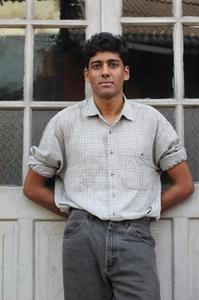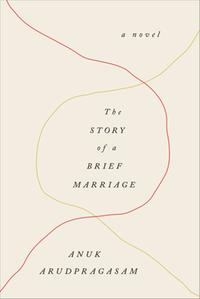
|
|
| photo: Halik Azeez | |
From Colombo, Sri Lanka, Anuk Arudpragasam is living in Brooklyn, N.Y., while completing a dissertation in philosophy at Columbia University. He writes in Tamil and English. The Story of a Brief Marriage (Flatiron Books, September 6, 2016) is his first novel.
On your nightstand now:
I don't have a nightstand, but I am reading a couple of books at the moment, and I do occasionally read them before I go to sleep, and I do occasionally place them on the floor by my bed before turning off the lights. I'm reading A Million Windows by Gerald Murnane, which I feel is inferior to his excellent Barley Patch, and Richard Lattimore's translation of The Iliad, which I'm reading for a class that I will be teaching in the autumn.
Favorite book when you were a child:
The Goosebumps series by R.L. Stine.
Your top five authors:
Robert Musil: The first novel of his I read was The Man Without Qualities, but I prefer his earlier works, especially the novel The Confusions of Young Törless and the novella The Perfecting of a Love. Both can be a little hard to read at times, because of how much they abandon the outer world in favor of the inner life of their protagonists, but the precision and devotion with which he captures certain aspects of this inner life really feels unparalleled. He's also very interested in abnormal states of consciousness--intoxication, mental illness, sexual/romantic excitement, athletic exertion/exhaustion, etc.--and I guess I'm attracted to his work by its suggestion that these states are indicative of the existence of something outside the compass of ordinary life.
Péter Nádas: I read his novel A Book of Memories for the first time two years ago, and have gone back to it several times since then. He pays meticulous attention to the psychology of the body--to the minutiae of gaze, posture, gait, movement, hesitation, gesture, mannerism--and its relationship to what is more conventionally thought of as psychology--to moods, feelings, urges, desires. These are studies of the body in the moving world, but his way of going into these studies in the midst of action has the effect of slowing down time, so that events that occupy moments or minutes are expanded out and one has the sense, in reading, of being in an eternal present.  Clarice Lispector: She is probably the writer on this list who has least influenced my writing style, but only because her own is so sui generis. One senses she abandons the conventions of plot, characterization, etc., not out of a desire to experiment but out of a real impatience with anything but getting to the bottom of herself. She registers the atomic movements of her subterranean life with a strangely distorted or deformed language that feels like it has been peeled away somehow from the objects of the external world, and she does it with a conviction that makes those movements seem more real than the visible world around her.
Clarice Lispector: She is probably the writer on this list who has least influenced my writing style, but only because her own is so sui generis. One senses she abandons the conventions of plot, characterization, etc., not out of a desire to experiment but out of a real impatience with anything but getting to the bottom of herself. She registers the atomic movements of her subterranean life with a strangely distorted or deformed language that feels like it has been peeled away somehow from the objects of the external world, and she does it with a conviction that makes those movements seem more real than the visible world around her.
Andrei Platonov: Most of what I've read of his has been in various translations put out by NYRB in recent years, my favorite of which consists of a novella and short stories collected under the title Soul and translated by Robert Chandler. The title piece is an exploration of human life under circumstances of extreme degradation, of people without home, land, family, mind or dignity, and focuses especially on human relationships and the conditions under which they function and cease to function. He is a very sad writer, but also extremely earnest and extremely tender. I think he's the only writer on this list that I actually have love for.
Marcel Proust: I won't explain this choice, since the author is already a well-established part of the Western canon.
Book you're an evangelist for:
I try not to be an evangelist for any book, though I suppose I often fail. Sometimes people are too busy to read a particular book, or not in the right frame of mind to read a particular book, or are simply not in need of the specific kind of enrichment or consolation offered by a particular book. Many people I'm close to look for enrichment or consolation in activities very different from reading, and that fact is always at the back of my mind not only when I recommend a book but also when I write.
Book you most want to read again for the first time:
The only time I remember feeling this way was as a child, first on reading The Day of the Triffids by John Wyndham, and then on reading a few of the books in the Harry Potter series.

